Have your houseplants withered or stunted growth as if they are only for some days? If it is true, you must check the previous feeding dose.
It is always a cautious job to feed sick plants, so read this article completely.
Table of Contents Show
Types of Fertilizer For Indoor Herbs
Chemical composition, nutrient availability, and product shape are the three key features distinguishing fertilizers.
Depending on the origin, they can be granular or liquid, slow-release or quick-release.
1. Granular Fertilizer
Dry slow-release fertilizers in granules or tiny lumps are offered as granular fertilizers.
Dry fertilizers are another name for granular fertilizers.
2. Liquid Fertilizer
Liquid fertilizers are accessible in liquid form and act swiftly. It can be applied to the soil directly or mixed with filtered water.
Liquid fertilizers are not great for herbs as they can be absorbed quickly. They do not last long as granular fertilizers.
3. Seaweed and Fish Emulsions
Seaweed-based fertilizer is a rich source of minerals, nitrogen, and vitamins, aided with growth hormones, and is less stinky than Fishmeal.
While Fish emulsions are completely decomposed natural sources of nitrogen with other trace nutrients required for growth.
When combined, you can use them for foliar spray or dilute them and apply them directly to the soil, although they are slow releasers.
4. Compost and Manure
Compost prepared from plant residues and Manure from grazing animals is a slow-releasing fertilizer solely from organic origin.
The fertilizer also includes worm casting, which is highly nutritious and filled with iron, magnesium, and nitrogen for indoor herbs with high porosity.
Synthetic Vs. Organic Fertilizer: For Indoor Herbs
Every fertilizer you use falls under the two major categories of Synthetic and Organic, depending on their source of origin.
| Synthetic Fertilizer | Organic Fertilizer |
|---|---|
| Inorganic compounds synthesized from the industrial by-products | Materials originated from plant and animal by-products |
| Quick-releaser | Slow-releaser |
| Immediate effect to the plant but can kill helpful bacteria | Enhance soil texture by holding water and helpful bacteria for longer period |
| High chances of overfertilization due to salt accumulation | Low or no chances of overfertilization as they have low level of nutrients |
Homemade Fertilizer for Indoor Herbs
One of the most preferred fertilizers is homemade for indoor herbs as you can easily prepare from the by-products of plants and foods and are usually organic.
Some of the DIY homemade fertilizers are as follows:
- Banana Peels: Banana peels are a rich source of potassium. So instead of throwing them in a dustbin, you can dump them in the pots, cover them with soil, or mix them with water and use them as a liquid fertilizer.
- Crushed Eggshell: You can use the eggshells by crushing them in mortar and pestle and spread over the top soil as they are a rich source of Calcium.

- Coffee Grounds: Mixing the coffee grounds with soil before planting or spraying by diluting in water ensure the soil becomes acidic. It is best for herbs that love acidity.
- Epsom Salt: Epsom salts are rich in magnesium and sulfur. So mix two tablespoons of Epsom salt with 1 gallon of water and spray over the soil monthly.
- Weed Tea: Mix a pound of garden weed in every 8 cups of water and leaves it for 24 hours. Afterward, remove the solid particle and use the liquid by diluting the tea and water to a 1:10 ratio. The mix will supplement the NPK requirement of the herbs.
10 Best Fertilizers for Potted Indoor Herbs
If you are short on time and cannot prepare homemade fertilizers, you can choose the available ones suitable for indoor herbs.
Here are the 10 Best Fertilizers for your Indoor Herbs:
| Fertilizers | Features | Product Image |
|---|---|---|
| Jobes Organics Herb Fertilizer | 2-7-4 NPK Contains Phosphorus Doesn't burn roots | 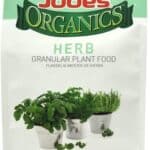 |
| Miracle-Gro Water Soluble Plant Food | 18-18-21 NPK Includes Natural ingredients | 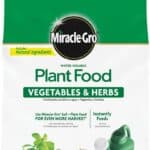 |
| ALL BIO - Organic Plant Food | 2-1-1 NPK Ecologically safe | 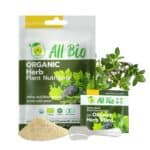 |
| EcoScraps for Organic Gardening Herbs | 5-4-5 NPK Climate friendly | 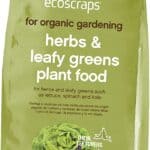 |
| Pepper and Herb Fertilizer 11-11-40 Powder | 11-11-40 NPK Great for hydroponics |  |
| Dr. Earth Home Grown Tomato, Vegetable & Herb Liquid Fertilizer | 3-2-2 NPK 100% Sustainable Fertilizer Created with recylced grocery produce, fish & meat |  |
| Neptune's Harvest Fish Fertilizer | 2-4-1 NPK Contains micro and macro nutrients naturally found in fish |  |
| Miracle-Gro Nature's Care Organic & Natural Herb Plant Food | 6-3-9 NPK High in calcium that herbs need to grow | 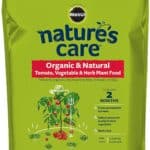 |
| Meghan's Garden All-Purpose Plant Food Fertilizer | 100% organic and biodegradable | 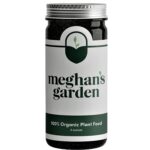 |
| Down to Earth Organic Vegetable Garden Fertilizer 4-4-4 | 4-4-4 NPK Ideal for use throughout the growing season. | 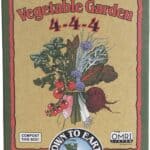 |
1. Jobe’s Organics Herb Plant Food
Jobe’s Organics Herb Granular Fertilizer has a combination of beneficial microorganisms that improve soil quality by reestablishing a natural balance between plant and soil.
The ratio of NPK of this fertilizer is 2-5-3.
Product Specification
| Item Form | Granules |
| Target Species | Herbs & Spices |
| Item weight | 4 pounds |
| Where to Buy? | Amazon, Walmart |
2. Miracle-Go Water Soluble Plant Food
Miracle-Gro Water Soluble Plant Food uses natural components in its fertilizer. The plant food feeds your garden quickly and effortlessly.
In addition, Miracle-Gro is also a handy alternative for container-grown plants that require regular Fertilizers to replace nutrients leached through the soil.
Product Specification
| Item Form | Granules |
| Target Species | Vegetables & Herbs |
| Item weight | 2 pounds |
| Where to Buy? | Amazon, Walmart |
3. ALL BIO-Herb Plant
The formula for All Bio Plant Nutrients aids in the growth of all components of herbal plants and is also climate-friendly, making it a sustainable approach.
In addition, with the usage of the product, you will notice a significant difference in the flavor and fragrance of the herbs.
Product Specification
| Item Form | Powder |
| Target Species | Herbs |
| Item weight | 10 grams |
| Where to Buy? | Amazon |
4. EcoScraps for Organic Gardening Herbs
Ecoscraps recycles food waste and repurposes it into organic, natural, and sustainable garden soils and plant food across the United States.
Aside from being a fertilizer, it is also a sustainable approach to better your gardening! It also has an NPK ratio of 5-4-5.
Product Specification
| Item Form | Granules |
| Target Species | Herbs & Leafy Vegetables |
| Item weight | 4 pounds |
| Where to Buy? | Amazon, Walmart |
5. Greenway Pepper & Herb Fertilizer
Greenway Pepper and Herb Fertilizer have the ideal balance of macronutrients and micronutrients for your pepper and herb.
In addition, this fertilizer is water-soluble and may be used in both hydroponic and potted plants. Not only that, no toxic metals or harmful materials are present in the fertilizer.
Product Specification
| Item Form | Powder |
| Target Species | Herbs, Pepper, & Hydroponics |
| Item weight | 2 pounds |
| Where to Buy? | Amazon |
6. Dr. Earth Home Grown Vegetable and Herbs Liquid Fertilizer
Home Grown Fertilizer provides nutrition to vegetable gardens, summer and winter crops, container plants, and natural backyard soil.
Likewise, it would be best to use it as a top dressing or compost tea during seed sowing, transplanting, and regularly.
Product Specification
| Item Form | Powder |
| Target Species | Herbs &Vegetables |
| Item weight | 1.9 pounds |
| Where to Buy? | Amazon, Walmart |
7. Neptune’s Harvest Fish Fertilizer
The Harvest of Neptune for organic farming is high in nitrogen, one of the most critical elements your plants require, with an NPK ratio of 2-4-1.
Neptune’s Harvest, unlike fish emulsions, preserves the fish proteins and oils and has no disagreeable odor.
Product Specification
| Item Form | Liquid |
| Target Species | Herbs, Vegetables, Trees, & Shrubs |
| Item weight | 0.14 gallon |
| Where to Buy? | Amazon, Walmart |
8. AgroThrive All-Purpose Organic Liquid Fertilizer
AgroThrive All Purpose Organic Liquid Fertilizer is 100% organic and will nourish and help your garden.
Similarly, the N-P-K ratio of this organic product is 3-3-2, making it suitable for vegetables, lawns, greenhouses, and herbs.
Product Specification
| Item Form | Liquid |
| Target Species | Herbs, Vegetables, Lawns, and Greenhouses |
| Item weight | 1 gallon |
| Where to Buy? | Amazon |
9. Meghan’s Garden All-Purpose Plant Food
The Meghan’s Garden aspires to create high-quality, environmentally friendly organic goods to assist gardeners and plant enthusiasts.
Similarly, the combination is safe for children and pets because it is 100 percent organic and biodegradable.
Product Specification
| Item Form | Powder |
| Target Species | Succulents, Flowers, Herbs, Bonsai, & Vegetables |
| Item weight | 56.5 gram |
| Where to Buy? | Amazon |
10. Down to Earth Organic Vegetable Garden Fertilizer
Down To Earth’s Vegetable Garden, 4-4-4, is packed with potent plant nourishment to aid in the growth of your garden.
For home garden fertilizer farms, this is a flexible blend. Similarly, the fertilizer is excellent for all growing seasons.
Product Specification
| Item Form | Granules |
| Target Species | Herbs, Tomatoes, & Spring Greens |
| Item weight | 5 pounds |
| Where to Buy? | Amazon, Walmart |
Managing Nutrient Needs in Container-Grown Herbs
Plants that grow in the ground have plenty of areas for their roots to spread out in quest of nutrition.
However, herbs cultivated in containers have significantly more limited roots, leading to over-fertilization if you’re not cautious.
Thus, apply a liquid fertilizer every three to four weeks throughout the growing season or a slow-release organic fertilizer one to three times a year.
Tips on Fertilizing Indoor Herbs
- Use compost instead of fast-acting fertilizers to top-dress your herbs.
- You can apply fertilizer at one-quarter of the recommended rate given on the package, regardless of the variety you pick.
- Use a well-draining pot for indoor herbs, as it is as essential as fertilizer in preventing overfertilization.
- After potting herbs, wait 4-6 weeks before fertilizing. This allows the plant to use up the nutrients in the growth medium.
- Not all herbs have the same need for fertilizers. Some slow-growing herbs need less fertilizer than fast-growing herbs.
- Do not apply granular fertilizer if the soil is dry. The root system can get damaged.
- If the roots are damaged, try repotting herbs in a new potting mix by mixing the fertilizer at the beginning.
- To transport nutrients throughout the container, give them plenty of water.
- Even when planted indoors, container-grown herbs do not require fertilizer in the winter.
Also watch,
To Conclude
Most herbs do not require as many nutrients as blooming and fruiting indoor plants.
Choose a fertilizer based on the herb’s nature, as some prefer acidic soil while some thrive in nitrogen-rich soil. So, determine the need for herbs before applying fertilizer.
